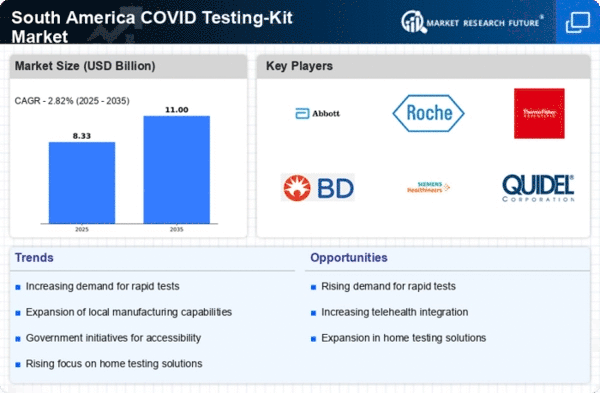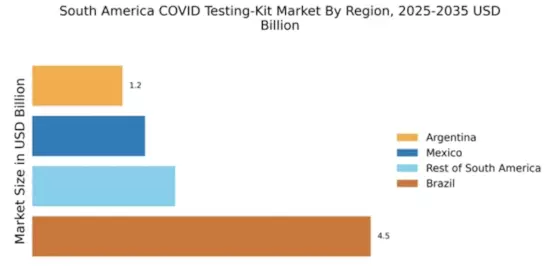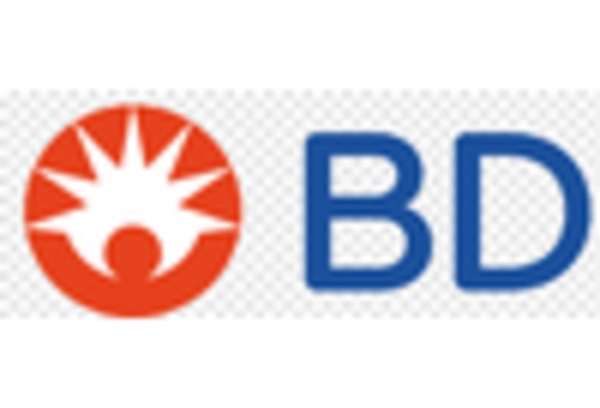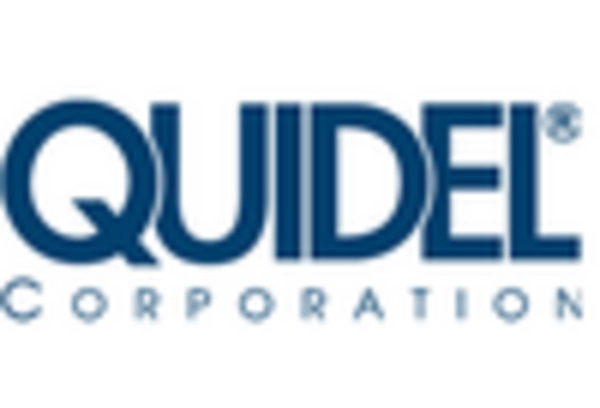Rising Health Awareness
The covid testing-kit market in South America experiences a notable boost due to increasing health awareness among the population. As individuals become more informed about the importance of early detection and prevention of diseases, the demand for testing kits rises. This trend is particularly evident in urban areas where access to information is more prevalent. According to recent data, the market is projected to grow at a CAGR of approximately 15% over the next few years. This heightened awareness is likely to drive consumers to seek out reliable testing solutions, thereby enhancing the overall growth of the covid testing-kit market.
Emergence of New Variants
The emergence of new covid variants continues to impact the covid testing-kit market in South America. As variants evolve, the need for accurate and timely testing becomes paramount. This situation has led to an increased demand for advanced testing solutions that can detect multiple strains. Market analysts suggest that the ongoing mutation of the virus could lead to a sustained demand for testing kits, with projections indicating a potential market growth of 10% annually. This dynamic environment necessitates continuous innovation within the covid testing-kit market to meet the changing needs of the population.
Government Initiatives and Funding
Government initiatives play a crucial role in shaping the covid testing-kit market in South America. Various countries in the region have implemented programs aimed at increasing testing capacity and accessibility. For instance, funding for public health campaigns and subsidized testing kits has been observed, which encourages widespread testing. Reports indicate that government spending on health-related initiatives has increased by around 20% in the past year. Such financial support not only enhances the availability of testing kits but also fosters public trust in the healthcare system, ultimately benefiting the covid testing-kit market.
Integration of Digital Health Solutions
The integration of digital health solutions is transforming the covid testing-kit market in South America. With the rise of telemedicine and mobile health applications, consumers are increasingly seeking convenient testing options. Digital platforms facilitate easy access to testing kits, allowing users to order them online and receive results through mobile applications. This trend is expected to enhance user experience and drive market growth. Recent statistics show that the digital health market in the region is expanding at a rate of 12% annually, indicating a strong correlation with the covid testing-kit market as consumers prioritize convenience and efficiency.
Increased Focus on Preventive Healthcare
The covid testing-kit market in South America is significantly influenced by the growing emphasis on preventive healthcare. As healthcare systems shift towards proactive measures, the demand for testing kits is likely to rise. This shift is driven by a desire to reduce healthcare costs and improve overall public health outcomes. Data suggests that investments in preventive healthcare initiatives have increased by approximately 18% in recent years. Consequently, this focus on prevention is expected to bolster the covid testing-kit market, as more individuals seek testing as a means of safeguarding their health.

















